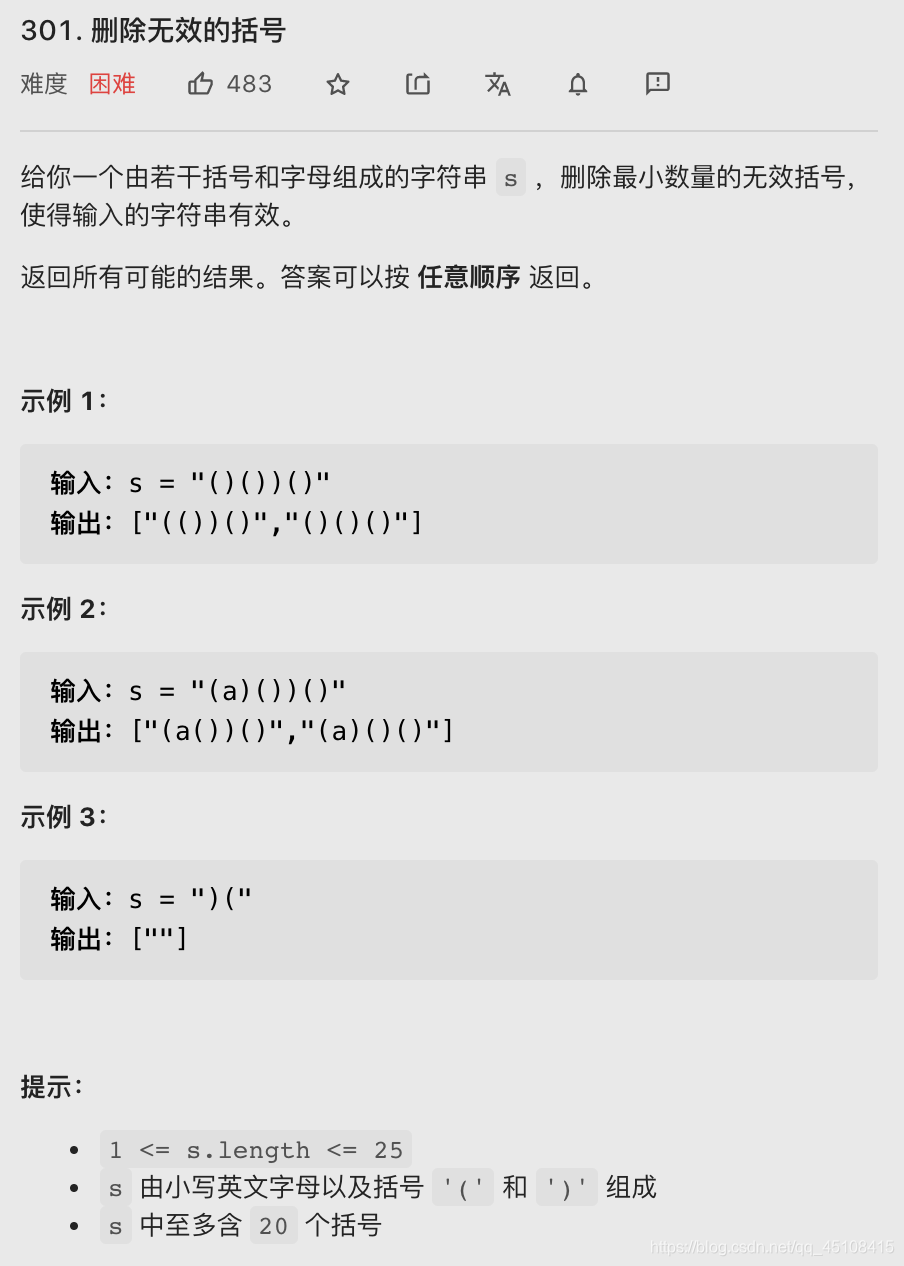题目描述
- 【所有可能结果】-> 【暴力DFS】

思路 && 代码
- 代码比较长,但是总体思路很清晰。
- 剪枝:舍弃左括号、舍弃右括号两种情况(见注释)
- 分情况:当前字符有【左括号】、【右括号】、【字母】三种情况,字母直接取,不影响
- 具体见注释的 Case 分类,有清晰说明
- 去重:先通过 Set 存储所有当前可行解
- 筛选:dfs结束后,len 为删除最小数量无效括号后的字符串长度。用于对 Set 中的有效括号进行筛选。
class Solution {
int len; // 维护有效字符串的最长值
public List<String> removeInvalidParentheses(String s) {
char[] arr = s.toCharArray();
int right = 0;
// 右括号计数:用于 dfs 剪枝(选取左括号数量,一定不能大于右括号数量)
for(char c : arr) {
if(c == ')') {
right++;
}
}
// Set 用于去重
Set<String> set = new HashSet<>();
dfs(arr, 0, 0, right, new StringBuilder(), set);
List<String> ans = new ArrayList<>();
for(String str : set) {
// 筛选
if(str.length() == len) {
ans.add(str);
}
}
return ans;
}
public void dfs(char[] cs, int index, int score, int max, StringBuilder cur, Set<String> ans) {
// Case 1: 结束
if(index == cs.length) {
// 合法,并且长度够的情况
if(score == 0 && cur.length() >= len) {
// 加入 Set 中,并且维护 len
len = cur.length();
ans.add(cur.toString());
}
return;
}
// Case 2:当前为左括号
if(cs[index] == '(') {
// Case 2.1:选择【加入】当前左括号(如果 score + 1 > max,说明后面右括号【肯定】不够了)
if(score + 1 <= max) {
dfs(cs, index + 1, score + 1, max, cur.append('('), ans);
cur.deleteCharAt(cur.length() - 1);
}
// Case 2.2:选择【不加入】当前左括号
dfs(cs, index + 1, score, max, cur, ans);
}
// Case 3:当前为右括号
else if(cs[index] == ')') {
// Case 3.1:选择【加入】当前右括号(左边有提供左括号)
if(score > 0) {
dfs(cs, index + 1, score - 1, max, cur.append(')'), ans);
cur.deleteCharAt(cur.length() - 1);
}
// Case 3.2:选择【不加入】当前右括号
dfs(cs, index + 1, score, max, cur, ans);
}
// Case 4:当前为字母,直接【加入】,不影响
else {
dfs(cs, index + 1, score, max, cur.append(cs[index]), ans);
cur.deleteCharAt(cur.length() - 1);
}
}
}
- 无注释版
class Solution {
int len;
public List<String> removeInvalidParentheses(String s) {
char[] arr = s.toCharArray();
int right = 0;
for(char c : arr) {
if(c == ')') {
right++;
}
}
Set<String> set = new HashSet<>();
dfs(arr, 0, 0, right, new StringBuilder(), set);
List<String> ans = new ArrayList<>();
for(String str : set) {
if(str.length() == len) {
ans.add(str);
}
}
return ans;
}
public void dfs(char[] cs, int index, int score, int max, StringBuilder cur, Set<String> ans) {
if(index == cs.length) {
if(score == 0 && cur.length() >= len) {
len = cur.length();
ans.add(cur.toString());
}
return;
}
if(cs[index] == '(') {
if(score + 1 <= max) {
dfs(cs, index + 1, score + 1, max, cur.append('('), ans);
cur.deleteCharAt(cur.length() - 1);
}
dfs(cs, index + 1, score, max, cur, ans);
}
else if(cs[index] == ')') {
if(score > 0) {
dfs(cs, index + 1, score - 1, max, cur.append(')'), ans);
cur.deleteCharAt(cur.length() - 1);
}
dfs(cs, index + 1, score, max, cur, ans);
}
else {
dfs(cs, index + 1, score, max, cur.append(cs[index]), ans);
cur.deleteCharAt(cur.length() - 1);
}
}
}
二刷
- 二刷懵逼的地方:合法性维护
- 靠 score 来进行,众所周知 ‘(’ 随便加,等跑到结尾再算帐 (score == 0)
- 但 ‘)’ 不一样,得前面的 ‘(’ 数量够才行。( if(score > 0) )
- 由此上两点,可得出合法判断
- 【选出合法结果,维护最长合法长度】-》【由最终长度,筛选较小结果】
- 来了,无剪枝,无效率优化的写法!咱图的就是一个简单明了!
摆烂,慢得一 - 具体是少了 StringBuilder、char[] 等优化,但有效代码就 22 行,很简约!
class Solution {
int maxLen = 0;
Set<String> set = new HashSet<>();
public List<String> removeInvalidParentheses(String s) {
dfs(0, 0, "", s);
List<String> ans = new ArrayList<>();
for(String temp : set) {
if(temp.length() == maxLen) {
ans.add(temp);
}
}
return ans;
}
void dfs(int score, int index, String now, String s) {
if(index == s.length()) {
if(score == 0 && now.length() >= maxLen) {
maxLen = now.length();
set.add(now);
}
}
else if(s.charAt(index) == '(') {
dfs(score + 1, index + 1, now + '(', s);
dfs(score, index + 1, now, s);
}
else if(s.charAt(index) == ')') {
if(score > 0) {
dfs(score - 1, index + 1, now + ')', s);
}
dfs(score, index + 1, now, s);
}
else {
dfs(score, index + 1, now + s.charAt(index), s);
}
}
}
版权声明:本文为qq_45108415原创文章,遵循CC 4.0 BY-SA版权协议,转载请附上原文出处链接和本声明。